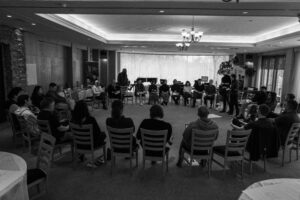
“From Bread to Freedom”
The famous cartoon depicting a prisoner choosing between a slice of bread and a key to his freedom offers a poignant commentary on the education system and our decision-making around it. The prisoner opts for the immediate relief of hunger, ignoring the long-term liberation the key offers. This scenario mirrors the current state of our school system, where institutions and teachers have for too long focused on the immediate achievements of GCSE’s, AP’s and A-Levels, epitomized by exam scores, at the obvious expense of long-lasting skills and holistic development.

The Prisoner, the Bread, and the Key
Is The Era of High-Stakes Exams is Over
Recent announcements from British International Schools and independent educational institutions like Latymer Upper School in Hammersmith could mark a tectonic shift in the British educational landscape (and beyond). The Council of British International Schools (COBIS) openly criticized high-stakes exams and an overloaded curriculum for stifling holistic student development. The Latymer Upper School plans to abandon GCSEs, save for English and Maths, in favor of their own qualifications designed to foster a broader skill set.
Approaching a Holistic Way to Learn and Assess
Is it finally time to pick the key over the bread? Schools like my own THINK Global School have already adopted forward-thinking approaches that prioritize students’ creative problem-solving skills, critical thinking, collaboration, and leadership through portfolio’s over the rote learning for exams. This switch is essential not just for students’ well-being but also for equipping them for the complexities of today’s industry, workplace and the onset of artificial intelligence.

The Hakuba Forum Discuss New Models of Education (THINK Learning Studio)
New Criteria for Success
The call for reform is not merely about changing the grading system but about reimagining the way we define success. COBIS and other educational leaders are advocating for portfolio-type evaluations that give a genuine appraisal of students’ capabilities, strengths, and talents. These young learners a growing body of educators is beginning to realise is far more than a two hour memory test.
Integrating a Dynamic Curriculum
With all this said, are we finally approaching the point where the traditional academic approach could be abandoned? COBIS has urged for the implementation of a curriculum that prepares students for the modern world, focusing on essential skills like digital literacy, critical thinking, and global citizenship. Think Global School has argued for more real-world learning, School of Humanity has argued for more missions and challenges — and others who have been watching these new schooling models develop and thrive – are beginning to see the benefits and call for change.
The Future is Flexible
A curriculum sufficiently flexible to incorporate various teaching methods, including AI-assisted learning, the Metaverse, and “lenses of future” introduced by our own curriculum this year such Genomics and Money-Mechanics. Indeed, this flexibility and a greater connection to futures and foresight can help students adapt better to the ever-changing world.
The Way Forward
The current global educational market generates billions in revenue, impacting millions of students worldwide. Many have clearly benefited from the outdated exam system, but there is now a huge question of ethics, practicality and morality. The ethics around limiting students ability and chances to engage with more the world around them, the practicality of addressing mass teacher shortages, and finally the morality of the shortcomings of memory tests to determine one’s future. As COBIS put it (for the British system, but we also must acknowledge the issue for systems beyond this), the time is ripe for “resetting the direction of the British education system.”
Just like the prisoner in the cartoon, the education system faces a crucial decision: continue feeding on the bread of high-stakes exams, or grasp the key to holistic, future focused, 21st-century education.
THINK Global School and the THINK Learning Studio has already made it’s choice. The question is, have you?










